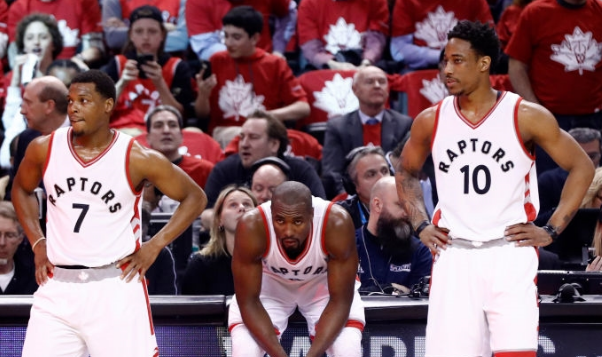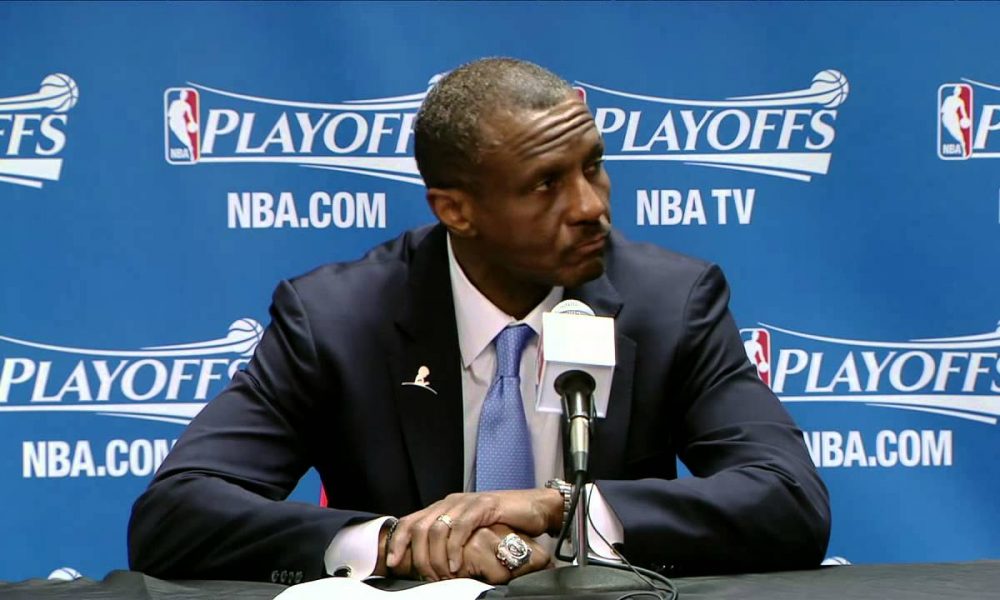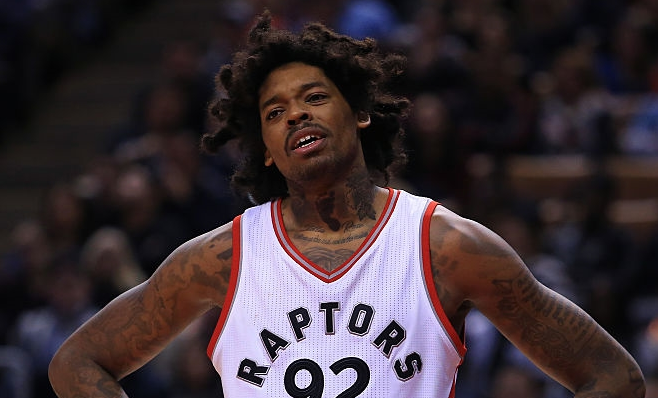The Toronto Raptors took their shot and came up short. It was and remains a commendable approach, to attempt to maximize the near-term window, try in earnest to topple the seemingly inevitable, and walk away without the potential for nagging what-ifs in the event of a LeBron James injury, an ethereal clicking of an intangible nature, or a series of smaller breaks and improvements. The Raptors attempted to close the gap with the Cleveland Cavaliers, which is great. Coming up short leaves them facing a number of tough questions from here, because taking a proper shot is only tenable for so long.
Whether or not the Raptors are at the point where being merely good has grown old is the biggest answer team president Masai Ujiri and staff will have to answer this offseason. Kyle Lowry will have a say in it, sure, and if that domino falls a certain way, the decisions of their other free agents will factor in. But before any player is signed or signs elsewhere, the Raptors will go through a long period of introspection to determine the right path forward, not dissimilar to what they had to do after being swept by the Washington Wizards in 2014-15, albeit with much more information, success, and positivity to provide the necessary cache to make tough calls.
Were the path forward clear and the offseason simply about executing an obvious plan, the summer would set up much differently. A year ago, the Raptors needed only to re-sign DeMar DeRozan, fortify around the edges, and improve where a tough salary cap situation and a pair of draft picks allowed them to. After their defeat at the hands of the Brooklyn Nets three years ago, it was a simpler matter of just acquiring as much talent and value as possible. For a few years prior, the goals were similar but with a longer-term outlook in mind. You can do well or do poorly in an offseason like that, and there is plenty of room for argument and debate about the best approach.
But at least knowing the best approach informs that discussion.
That there is no clear proper approach for the Raptors from here figures to make big-picture offseason decisions more difficult and the more micro decisions far more scrutinized. Not that it should matter to the organization, but whatever they choose to do figures to be fairly divisive in the fan base, because there are two pretty distinct camps forming at the poles, and neither side is right or wrong. In fact, the situation the Raptors find themselves in is a snapshot of one of the most difficult philosophical questions in all of sports, one most teams in most leagues face at one point or another: Is winning a championship the only goal?
For the Raptors, that question can get a little more granular and specific to the history of the franchise. For a team with a rich history of success, there may be more rope with a fan base and market in terms of tearing things down and willingly accepting being a lesser team in order to be in a better position to win a title a little down the line. For a team like the Raptors, only now experiencing their first sustained bout of respectability and success, playing in a competitive market where their biggest competition for attention, media space, and dollars is on the upswing having just torn things down themselves, that’s a more complicated question. The fan bases of the two teams are different, of course, and one team shouldn’t dictate the moves of the other, but the long-term health, popularity, and momentum of the team is an important consideration (whether the Toronto Maple Leafs getting better after tanking makes it more or less difficult for the Raptors to do the same is a matter of debate for another time).
These questions are complex, nuanced, and don’t have a correct answer. Some fans, players, and executives ultimately measure success only by rings. That’s a fine approach – it is the entire point of each season and sport in general, to be the very best, to achieve the greatest success, to know for certain at the end of the day that the path worked, to know that the effort paid off, and to have the process validated. Nobody can be faulted for viewing things this way, but it does take an honest acceptance of the difficulty of that approach. Prospects are incredibly fun to dream on and watch grow. They’re also lottery tickets, not sure things.
The Raptors have never done a proper, Sam Hinkie-style tear-down, but they have been bad often enough and long enough to have a good idea of the pain that path entails. It is paved with thorny uncertainty and sometimes rewarded with an Andrea Bargnani at No. 1 or, worse, the misfortune of no No. 1 at all. As I write this, I am wearing a Trust The Process Christmas t-shirt (it is playoffs-are-finally-over laundry day), and I have a tattoo that essentially translates to that same mantra. I’m here for a calculated rebuild aimed to maximize a franchise’s long-term expected value. It’s just that life operates with a sample size of one, and even though that strategy possesses the highest likelihood of finding the star that’s so necessary to win a championship, it is still just that: A likelihood, a balance of probabilities, and a weighted coin flip.
Those on the other side may be a little more pragmatic in terms of the day-to-day, year-to-year value of sports. Fandom, though, is by definition irrational, and so it’s difficult to fault those who don’t see the value in repeating at the same level without a means or a chance of taking the next step. The Atlanta Hawks of the 2000s and present-day Los Angeles Clippers (shout out to The Great William Lou) have been derided some for stalling out in the first or second round, for consistently being a tepid threat rather than the threat.
The counter is that those teams were good for a fair amount of time. The Hawks weren’t quite able to capitalize, but the Clippers have gone from a laughingstock for eras defined by inadequacy and stupidity to being chuckled at for, you know, only being really good all the time. The Raptors hadn’t made the playoffs four years in a row until this season, ever. They’d never won a seven-game playoff series or made it past the second round until last year. They’d never repeated in the second round until this season. They’d never won 50 games once, let alone twice, or won a division, had dual All-Stars in multiple seasons, made splashy deadline acquisitions that felt like they mattered, or retained their own star past the usual, almost financially mandated second contract. The list goes on.
For fans who live and breathe the team’s every game, every possession, it’s a heck of a lot easier to do so when the team is good. It’s a matter of preference and perspective, really, and as I’ve reflected on the last few seasons and what the Raptors should do from here, I’ve found it difficult to find fault in the path others may prefer. The title-or-bust mentality is, at the root, what the competitive side of sports is all about. The “stay good and give your fans an entertaining product and make a decent playoff run and always be in a position to pivot in either direction if things change” mentality is, at its root, what the sports-as-entertainment side is all about. (And as much as some will shoot down the thinking the Raptors are or can be close again, there are some caveats that are important to recognize in that thinking, too.)
They are two diametrically opposed approached to team-building and fandom, and it’s those differences in philosophy – not a difference in intelligence or analysis or some semblance of being correct or incorrect – that will color a lot of our offseason debates here. As long as the Raptors don’t split the middle with a half-measure (essentially losing Lowry but still trying to compete, a strategy that would probably make them first-round playoff fodder given their free agency constrains, or even rolling the same core back without a fundamental shift in voice or scheme [plenty more on these notes in the coming weeks]), Ujiri and company are going to have a decent justification for their approach. Either they’re taking a major step back in order to maximize their more important window later, or they’re staying the course to maximize what they’ve stumbled upon here.
In the coming days, weeks, and months, we’ll be breaking down all of the options, scenarios, paths, and contracts. I’d imagine any question or angle you’ve been thinking about or commenting about, we’ll look at in-depth or at least touch on. There are so many questions, so much to cover, and six weeks of dead-ish space before the draft, we can’t (and shouldn’t) do it all at once. We’ll get there, though. As I worked through locker clean-out day and reflected, I felt the need to kind of work things through on paper like this (and maybe to fruitlessly prime the comment sections to be less vitriolic this summer – yeah right) and get my mind right for the difficult but exciting offseason that lies ahead. Difficult questions are great, because things aren’t difficult when you’re not in a decent place. These questions don’t have clear answers, though, and the ones that materialize may require occasionally looking at al alternate perspective to understand.



